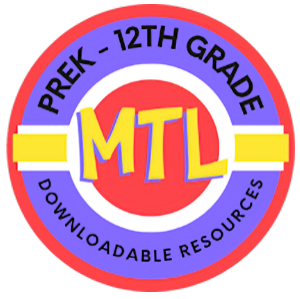Showing 1–20 of 53 resultsSorted by latest
-
 $2.00Buy Now
$2.00Buy NowGive students a fun, engaging mini-book to create to help them learn about recycling! Recycle – Reuse – Reduce!
⭐Perfect to use during any student of our environment, our impact on the world, or for Earth Day!
⭐Students will have pages to color and put together creating a book that teaches and that they can keep! They’ll learn…
- The definition of recycle
- The definition of reuse
- The definition of reduce
- How to do all three (recycle, reuse, reduce)
- Examples of items to recycle
-
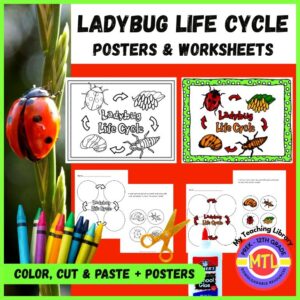 $2.50Buy Now
$2.50Buy NowA great resource to display and to get students hands-on putting together their own life cycle of the ladybug!
⭐Benefits of this resource:
- -Low prep – print and use/
- -Children learn about the ladybug life cycle both visually (poster) and in a fun and hands-on way as they color, cut and glue (worksheets).
- -Can be used to introduce the life cycle, or as a review/assessment to check understanding.
- -Encourages fine motor/scissor skills and sequencing.
- -Differentiated can be achieved by deciding if students are allowed to have the poster as a reference when completing their own life cycle.
- -Finished worksheets can be inserted into an interactive notebook.
⭐What else is included?
- -2 Life cycle posters (Color and Black/White) You can always allow students to color the b/w poster and keep.
- -2 student pages (worksheets). Students will color and cut out the 4 stages of the ladybug life cycle from the first page and glue in the correct sequence on the second page.
-
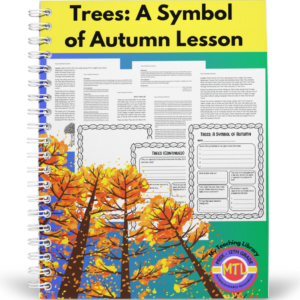 $2.50Buy Now
$2.50Buy NowA multi-age lesson to teach students (1st – 5th grades) about trees! The lesson is designed as a Fall (Autumn) outdoor/indoor activity lesson as the leaves are changing colors but can be easily converted to an indoor activity only. If using as an indoor only activity, be sure to have photos of trees to incorporate into the lesson.
Students will learn about:-
What trees provide
-
Aspects of a ‘living’ tree (how they get water, nutrients and breathe)
-
Parts (and their function) of a tree: roots, trunk, bark, branches, leaves
-
How leaves make food
-
Types of trees: deciduous and evergreen
Includes:
– Teacher lesson notes (guide)
– Student informational text
– Student activity worksheet pages
– Answer keys -
-
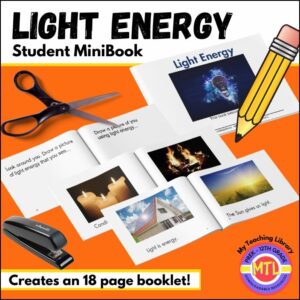 $1.75Buy Now
$1.75Buy NowStudents will create an 18 page mini-book as they learn about different sources of light energy!
-
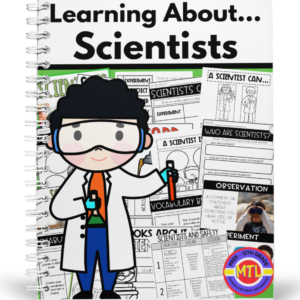 $5.50Buy Now
$5.50Buy NowIn this extended, interactive unit, students will learn all about scientists, what they do, the tools they use and science safety.
This is a LARGE unit. See description below for all that is included! Can be used as a notebooking unit.
-
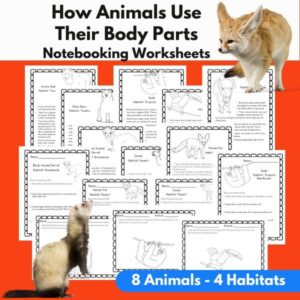 $3.00Buy Now
$3.00Buy NowIn this unit study, students will learn how 8 different animals (4 different habitats) use many of their body parts to live and survive. For each animal, students will be given a fact sheet, a short answer worksheet and a worksheet on which they will label and describe the specific body parts and how they are used.
Animals covered in this unit are:
– Desert Habitat: Camel, Fennec Fox
– Grasslands: Black-footed Ferret, Bison
– Tropical Rainforest: Sloth, Toucan
– Tundra: Polar Bear, Arctic Wolf -
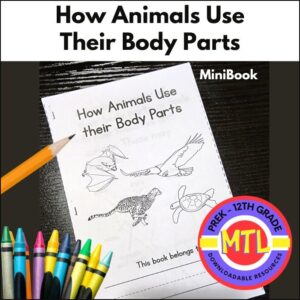 $2.50Buy Now
$2.50Buy NowA fun to create, Science mini-book teaching students how different animals use their body parts as tools to live and survive! Once students finish creating this 10 page mini-book, they will be able to give examples of how 7 animals use their body parts to get nourished, move within its environment and even stay protected from predators!
Animals included in this project are the cheetah, bat, loggerhead turtle, badger, kangaroo, deer and tundra swan. There is also a image of a wolf with showing various body parts often used to accomplish an animal’s survival.
Students will color, draw and write to complete the book.
-
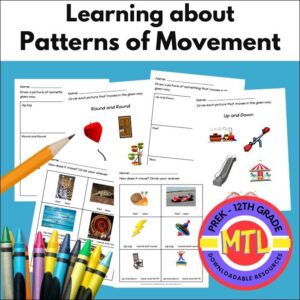 $1.50Buy Now
$1.50Buy NowLearning about various patterns of movement is an important Kindergarten and 1st grade Science concept that is introduced in these worksheets! The movements covered include:
– fast / slow
– ziz zag
– round and round
– straight line
– up and down
– back and forth -
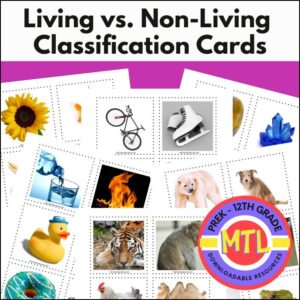 $2.25Buy Now
$2.25Buy NowHere is a set of 36 science classification cards to give students the ability to classify living and nonliving things! These cards include beautiful color photos of 36 different items plus two sets of classification mats.
-
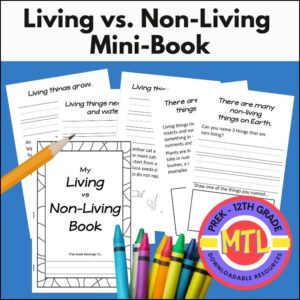 $2.25Buy Now
$2.25Buy NowThis living vs. nonliving booklet is perfect for kindergarten and 1st grade students just learning the science concept. It includes a cover page and 5 inside pages that will teach students that living things grow, need food and water as well as reproduce.
-
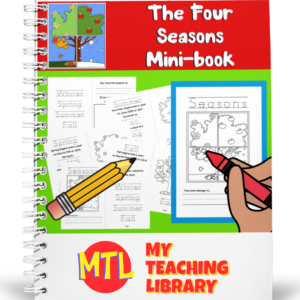 $2.50Buy Now
$2.50Buy NowStudents will learn about the four seasons, (winter, spring, summer and fall) while creating a cherished 12 page science mini-book! For each season, students will learn when that season begins and a fact about it.
Example: For spring, students will learn that spring begins every year on March 19th or 20th and that spring is warm and flowers begin to grow. Whey will be coloring, as well as tracing words and pictures! (Some seasons have more than one date when it may begin, as you see in the spring example. This allows this resource to be used every year and can be a springboard to a discussion as to why this is true if appropriate.)
-
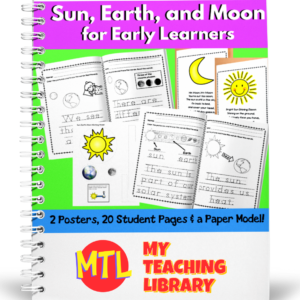 $3.00Buy Now
$3.00Buy NowThis unit is designed to help early learners learn about the sun, earth and moon through fun, engaging activities! Students will learn that the sun supplies heat and light to the earth, that the moon reflects light from the sun and rotates around the earth, that there are different phases of the moon (specifically in this unit: full, half and crescent), and more! Includes:
– 2 posters
– 20 student pages
– 1 interactive model craft -
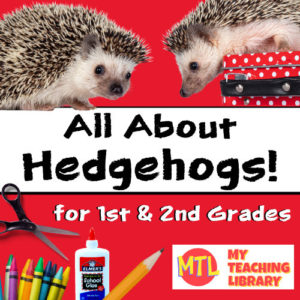 $4.00Buy Now
$4.00Buy NowStudents will learn all about hedgehogs, their life, habitats, life cycle and more with these activities and worksheets!
They will learn about where they live (habitats) their life cycle, that they are mammals, omnivores, nocturnal and about hibernation! This unit includes informational text with questions, tracing and copy work, creative and expository writing, plus activities including mini-book creation, ‘cut and glue’, drawing and more. All designed for the 1st and 2nd grader in mind to help build vital language arts skills as well as geography and science knowledge.
-
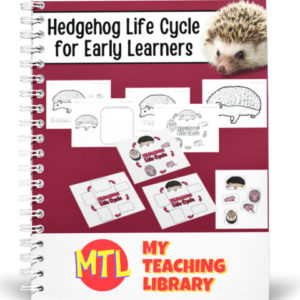 $2.50Buy Now
$2.50Buy NowThis hedgehog resource has been designed to help early learners (PreK – Kindergarten) to learn about the life cycle of a hedgehog! It includes a life cycle poster, a hands-on activity that can be used with students at different levels and several worksheets. These worksheets will have students coloring, tracing words and drawing!
-
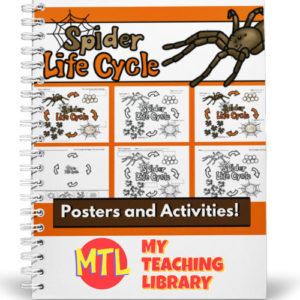 $2.00Buy Now
$2.00Buy NowWant to study the life cycle of a spider? Here is a resource for you!
Includes:
– 2 labeled posters (color and b/w)
– life cycle coloring page
– colorful center activity
– 2 cut-n-paste worksheetsUse as a standalone resource or combine with:
-
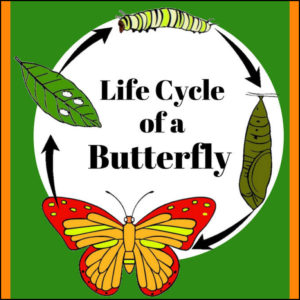 $1.75Buy Now
$1.75Buy NowThis Science resource will teach students the Life Cycle of a Butterfly and includes:
- * 2 color posters of the life cycle (1 with added details)
- * 1 b/w poster (for students to color),
- * 4 picture/information cards for each stage of the life cycle
- * 3 life cycle worksheets
-
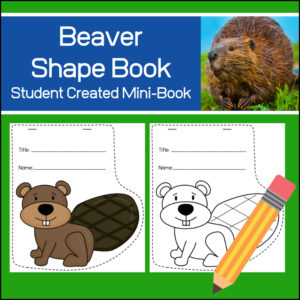 $2.00Buy Now
$2.00Buy NowStudying Beavers? Students will love to self-publish their own work in this cute Beaver shape book! Not only can they write creative stories or poems, but you can also have them use these templates to convey what they’ve learned (comprehension) from a book or from their own research! Template size: 7.5″ tall x 7″ wide.
Includes:
- 6 possible covers
- 13 different inside pages
I’ve created pages with both dotted-dashed lines as well as single lines so that you can use what best fits the level of your students.
-
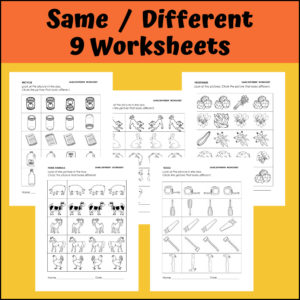 $1.50Buy Now
$1.50Buy Now9 worksheets for young students! Each worksheet has 5 rows of pictures. In each row, students will need to find and color the picture that is different. Extend the learning by reviewing each worksheet with the student(s) after completion. Have them tell you why or how each picture is different? If the difference is positional, discuss. If the picture is something entirely different (such as a different type of fruit or vegetable), discuss what the items are and how they are the same and how are they different.
-
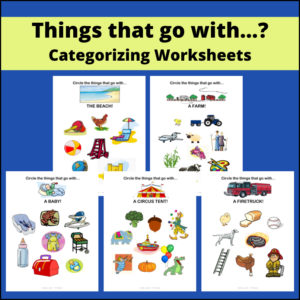 $1.00Buy Now
$1.00Buy Now5 picture worksheets for young learners to ‘circle’ items that go with a given item.
-
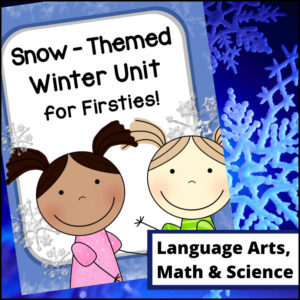 $8.50Buy Now
$8.50Buy NowWhen it is cold out and you want FUN, NO PREP lessons, this is the resource: Snow Themed / Winter Unit for Firsties!
This unit will provide you with a couple of months’ worth of learning activities!
Included:
- Language Arts Skills include reading comprehension, sentence sequencing, handwriting / copy work, snow vocabulary work, phonics (“sn” words), rhyming, poetry, punctuation (period, question mark or exclamation mark), complete sentence identification, noun or verb
- Math Skills: Symmetry, single digit addition and subtraction, even vs odd, number words, graphing, size comparison, telling time, counting money, greater than / less than
- Science: Learning about how snow forms and the five different types of crystals formed at various temperatures.
- Fine Motor Skills: Handwriting, Tracing, Drawing, Cutting and Pasting
